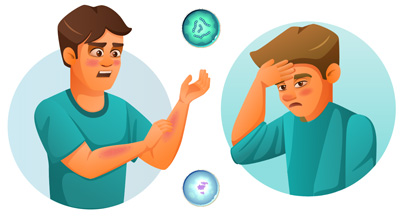Infection Risks Increasing for Sexually Active Men
Gary Snyder, HIV Prevention, Erie County Department of Health

Let's talk about sex. But we need to think beyond the usual bump and grind hazards. Men that are sexually active are being infected at higher rates for various diseases beyond HIV. For example, Erie County in the past year has seen increases in Gonorrhea and Syphilis among the MSM [Men having Sex with Men] residents. However sexually transmitted diseases are not the only things guys are coming into contact with these days. Perhaps you've heard about the monkeypox outbreak that is happening around the world. In May of 2022, the Centers for Disease Control and Prevention (CDC) began informing the public of multiple cases of monkeypox - a very rare disease typically associated with international travel or importing animals from outside the US. The cases reported recently [with one case in Pennsylvania] have included 'people who self-identify as men who have sex with men.' While it is not clear how they were exposed, being aware of the potential for exposure and infection is key in making our health a priority. The incubation period for Monkeypox ranges from 7 to 17 days. The illness begins with fever, headache, muscle aches, backache, swollen lymph nodes, a general feeling of discomfort, and exhaustion. Typically, within 1 to 3 days after the appearance of fever, the patient develops a rash of raised fluid-filled bumps, often first on the face but sometimes initially on other parts of the body, lasting 2 to 4 weeks. The CDC recommends JYNNEOSTM (also known as Imvamune or Imvanex), an attenuated live virus vaccine, which has been approved by the U.S. Food and Drug Administration for the prevention of monkeypox. Contact your personal care doctor to set up an appointment for your vaccination. To learn more about Monkeypox and Sex, check out this link/PDF: https://bit.ly/3x5TYDs
And while we're going over rising infections beyond HIV and STIs, the CDC this year also reported an outbreak of Meningococcal disease; a rare, but very serious illness caused by a type of bacteria. Their reporting has found "a large, ongoing outbreak of serogroup C meningococcal disease in Florida, primarily among gay, bisexual, and other men who have sex with men, including those living with HIV. Recent data show that about half of the cases associated with this outbreak are among Hispanic men. This outbreak is mostly affecting people who live in Florida but has also affected some people who have traveled to Florida." Seek medical attention immediately if you or your child develops symptoms of meningococcal disease. Symptoms of meningococcal disease can first appear as a flu-like illness and rapidly worsen. Symptoms may include: fever and chills, fatigue (feeling tired), vomiting, cold hands and feet, severe aches or pain in the muscles, joints, chest, or abdomen (belly), rapid breathing, and/or diarrhea. The best way to protect yourself during an outbreak - just like the ongoing pandemic of COVID-19, is to get vaccinated. Public health staff recommend keeping up to date with your vaccines as the best protection. Even if treated quickly, meningococcal disease can cause long term problems or be deadly. If you do not have insurance or Medicaid/Medicare, the Erie County Department of Health can provide your vaccine; call 814-451-5700 to set up an appointment. If you have insurance/Medicaid/Medicare, contact your personal care doctor to set up an appointment for your vaccination. To learn more about meningococcal disease as it relates to the MSM community, check out this link/PDF: https://bit.ly/3GGDrdH
For more information, contact the Erie County Department of Health at 814-451-6700 or ecdhinfo@eriecountypa.gov.



